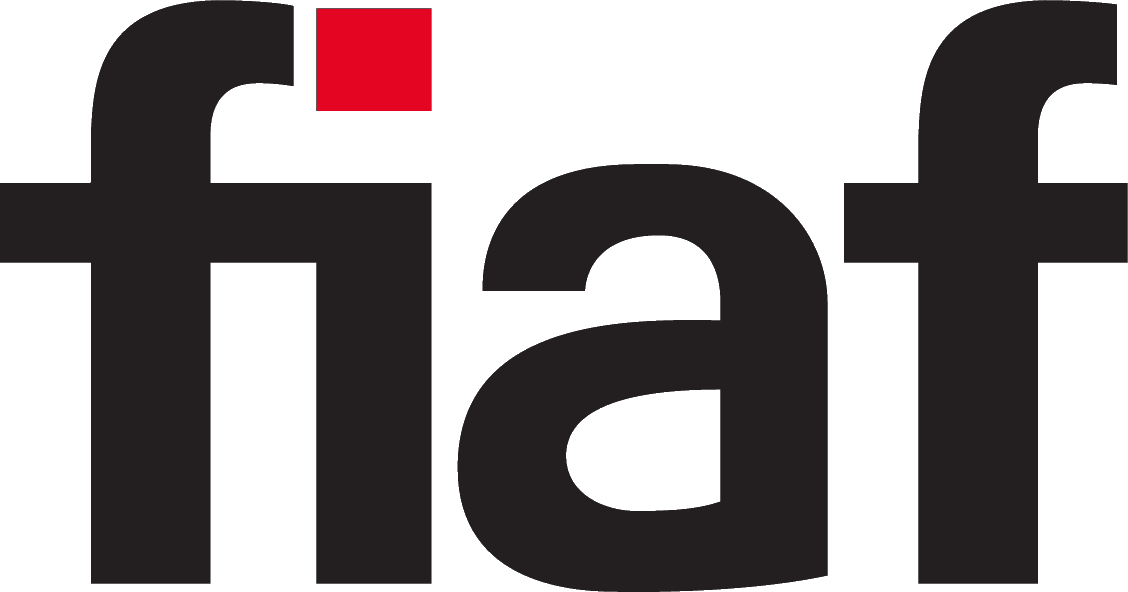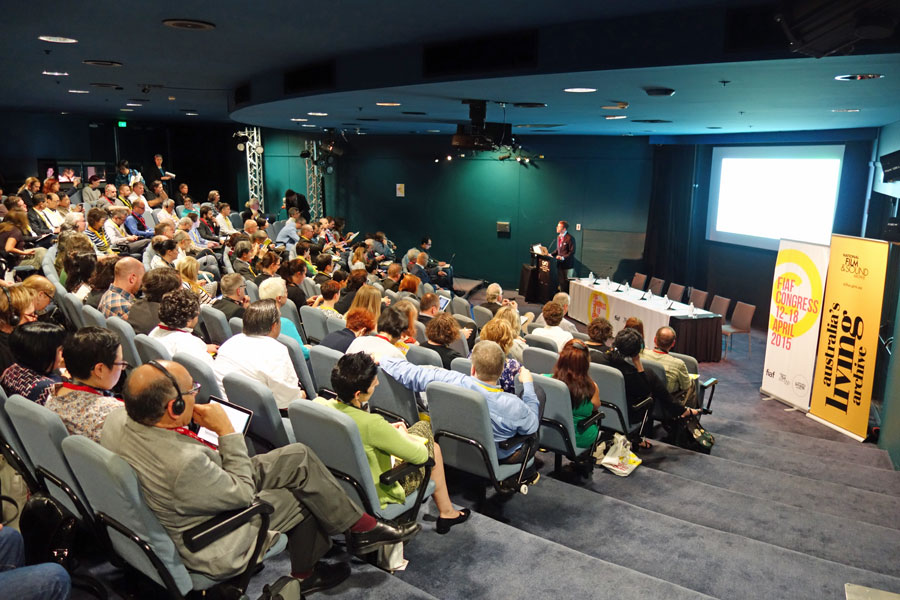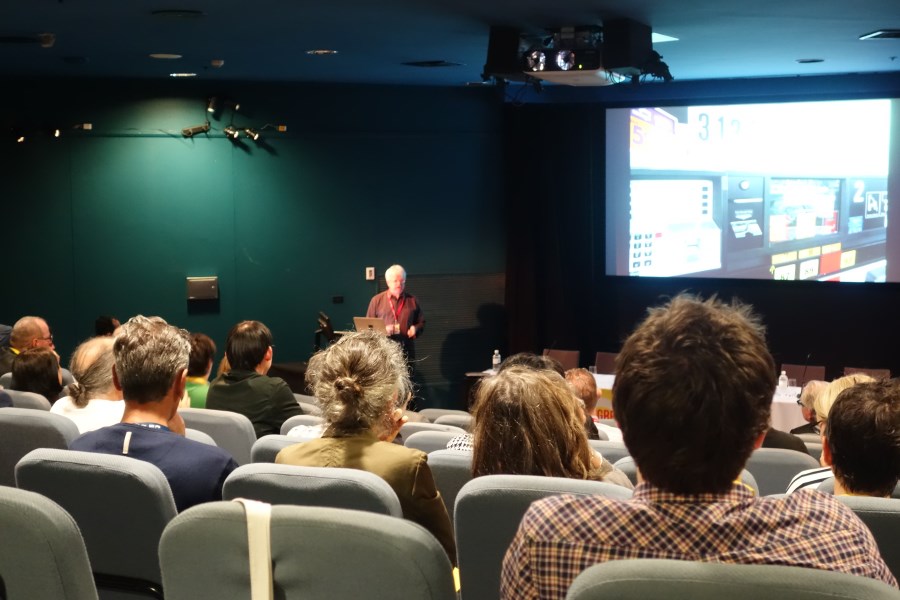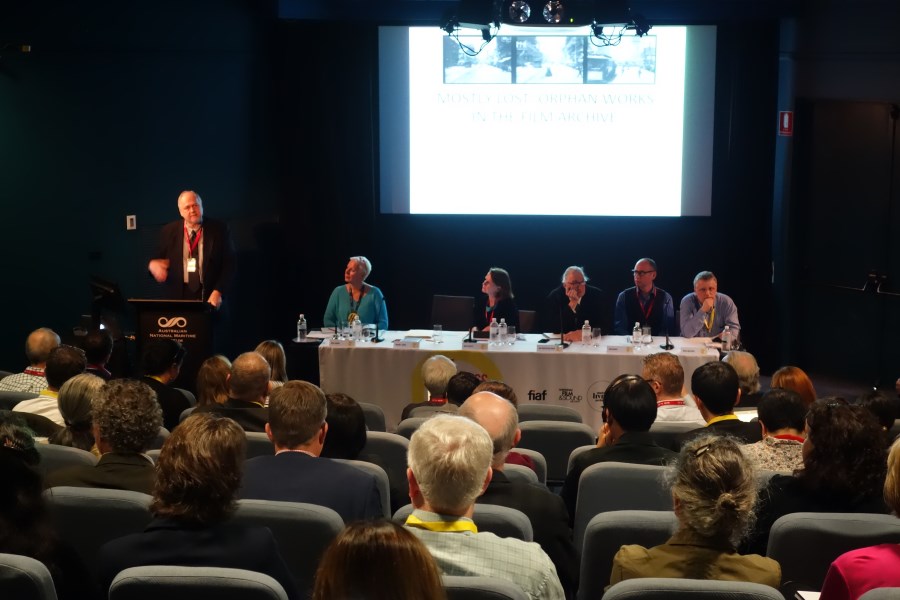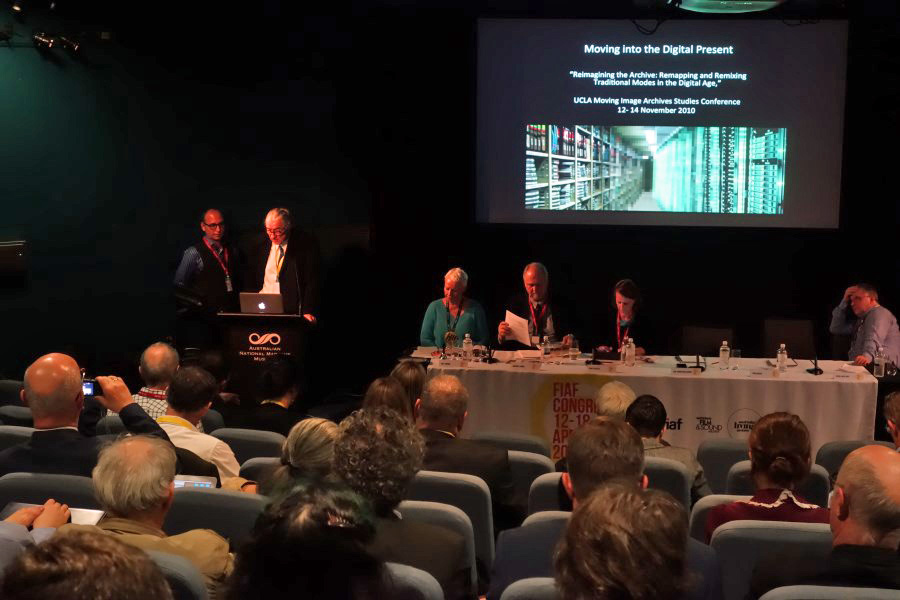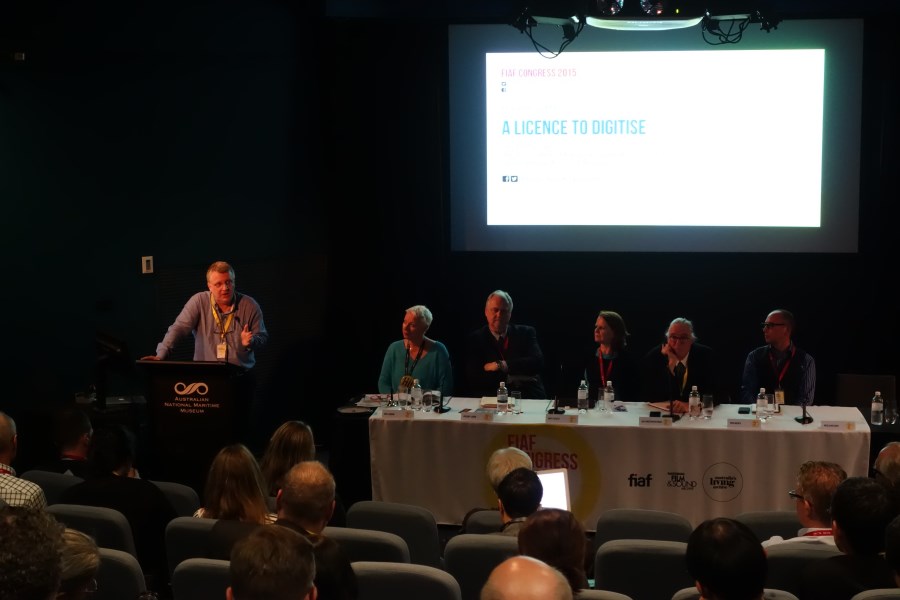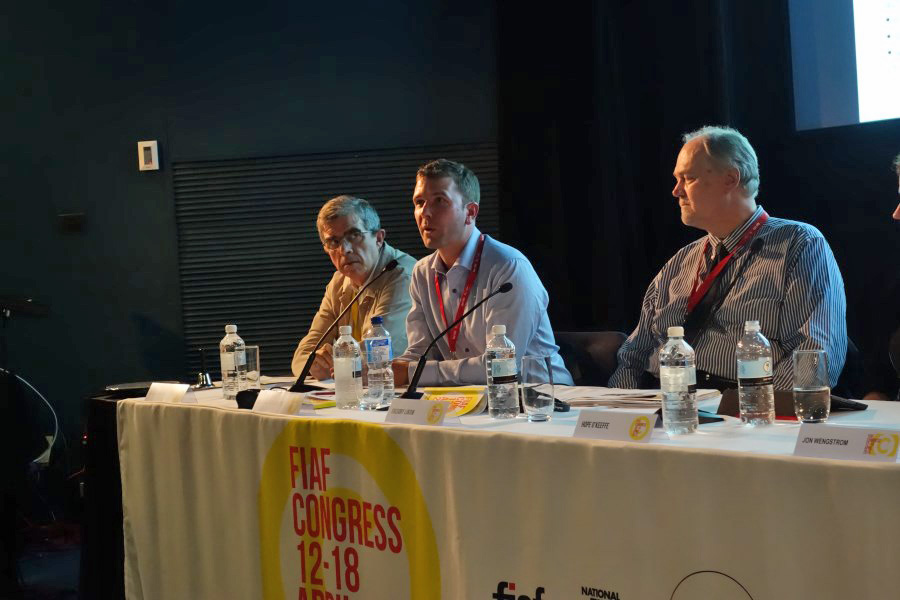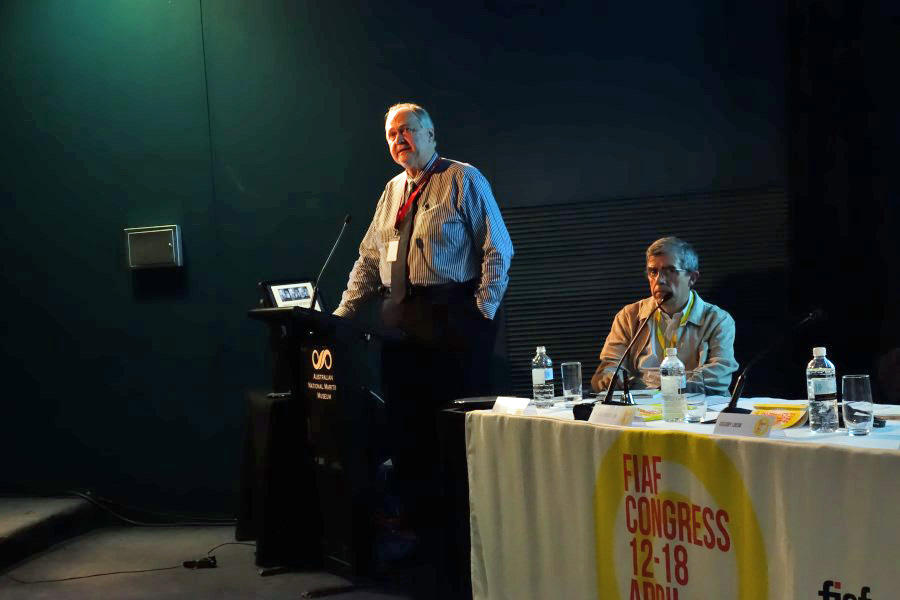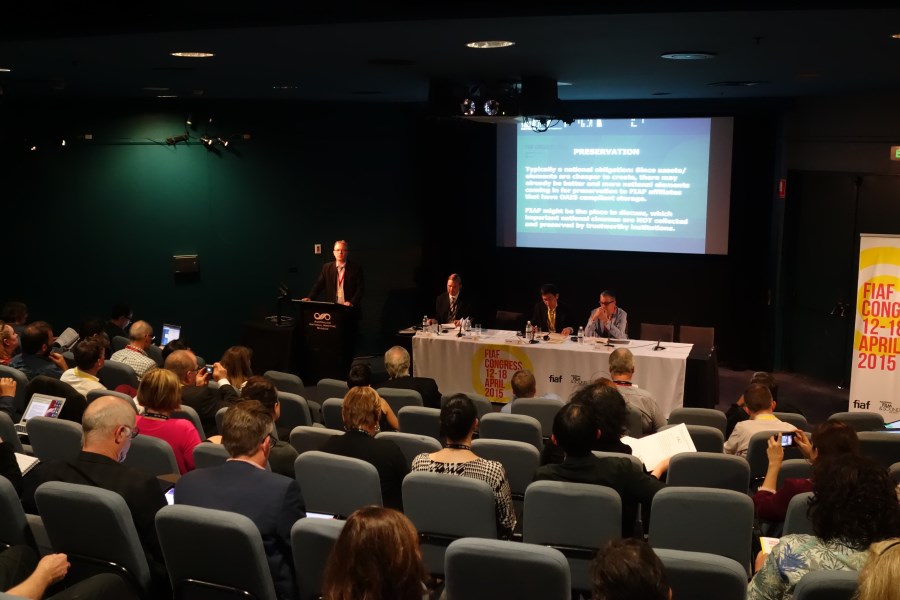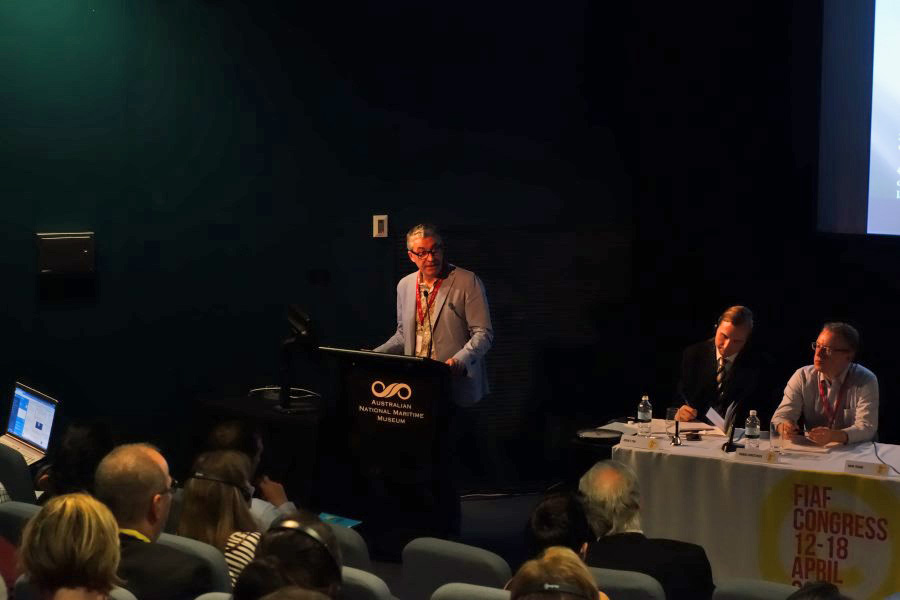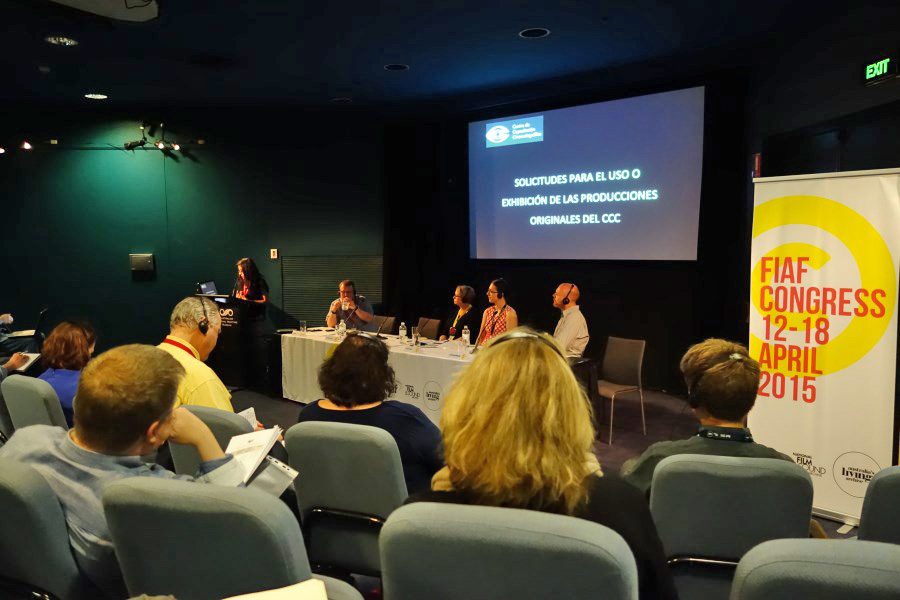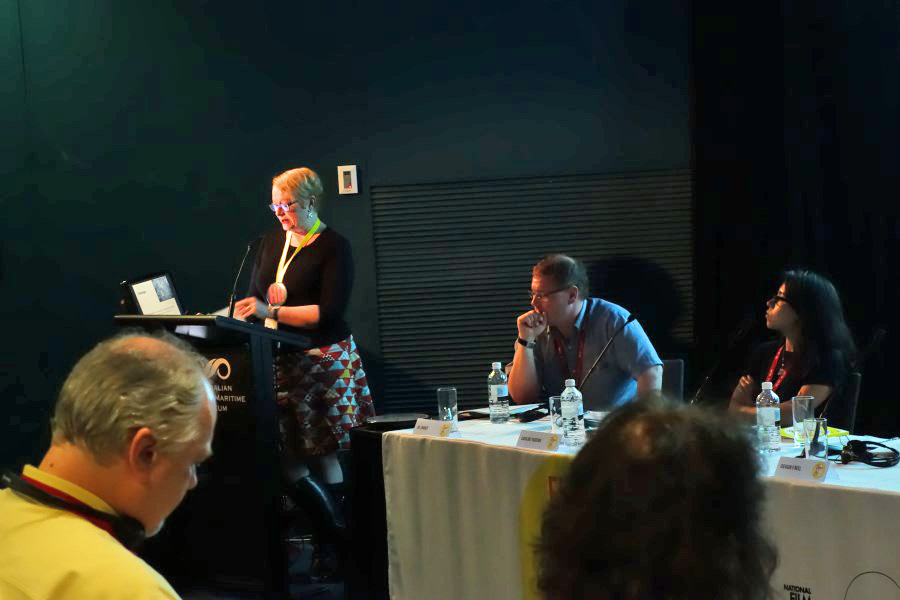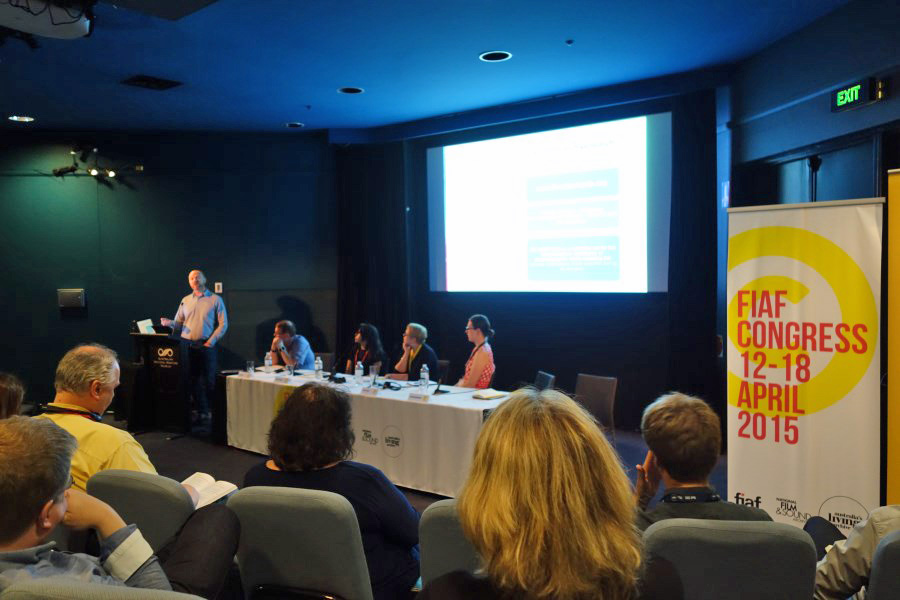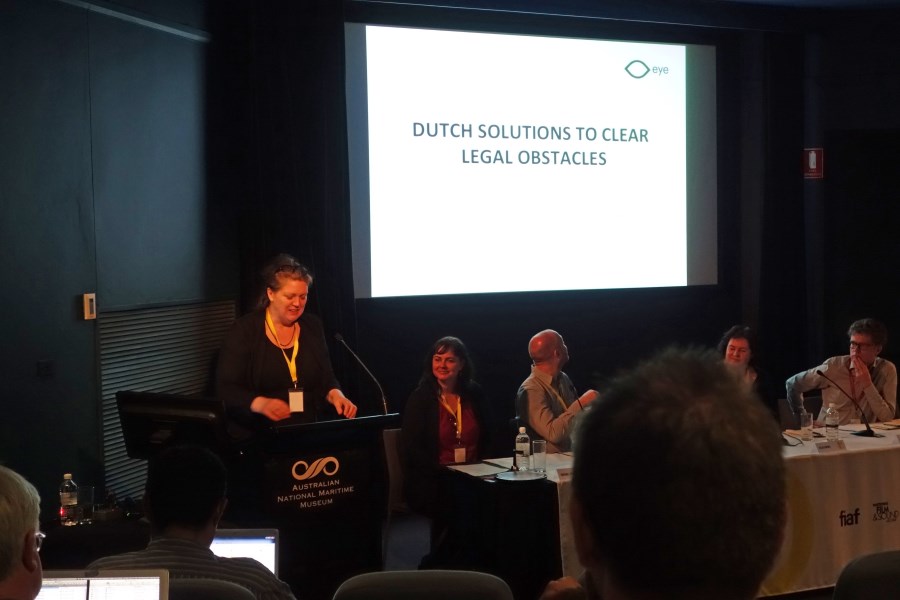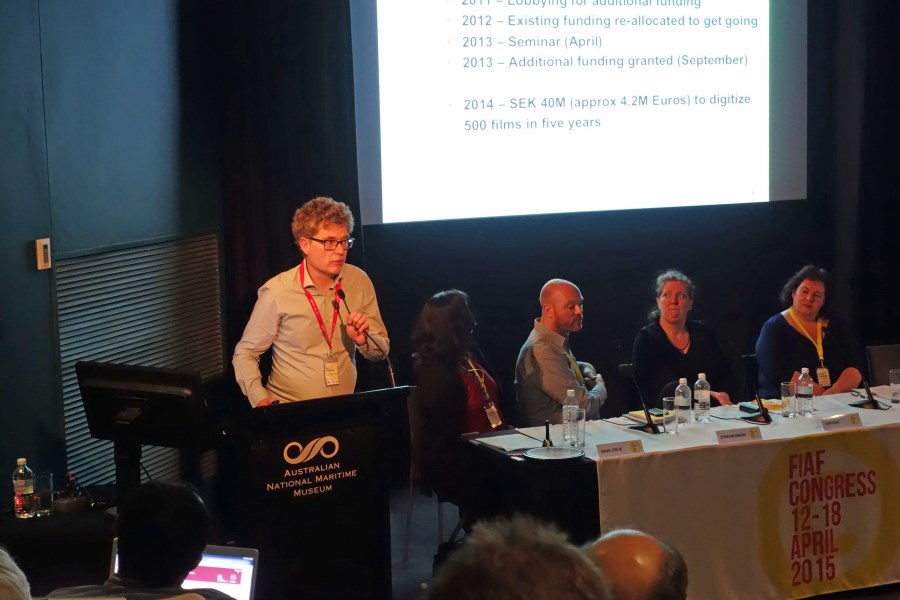2015 FIAF Symposium
“Fairly Legal - Intellectual property, content regulation and film archiving: where are we heading?”
You will find below the full programme of the 2015 FIAF Symposium, which took place on 13 and 14 April 2015 at the Australian National Maritime Museum in Sydney. It offers presentation texts, audio-recordings and slideshow presentations, unless we did not obtain permission to publish them online.
DAY 1: Monday 13 April 2015
Opening and welcome
Speaker: Michael Loebenstein, National Film and Sound Archive of Australia
Access the text of the presentation HERE.
Session 1: Keynote Speech
The Future of Memory: Disrupting the archives to save it
Moderator: Michael Loebenstein, National Film and Sound Archive of Australia
Speaker: Rick Prelinger, The Internet Archive
Abstract: In recent years traditional moving image archives have faced dramatic and disruptive externalities: the turn to digital production and distribution; the effective end of photochemical preservation technology; the marginalisation of the theatrical viewing experience; and the emerging public demand for universal, instant and free access to media. While each of these developments has the power to complicate the work of (and even threaten) the existence of established archives, archives are more resilient than many think. In recent years, many archives and other cultural heritage institutions have actively questioned unexamined beliefs and assumptions and begun to experiment with new workflows, new forms of access and new economic models.
This keynote sets out a number of possible visions for the future, many of which already exist today. The goal of this “radically traditionalist” talk is to address some of the paralysing uncertainties that currently afflict archives and archivists and suggest that archives can innovate without fear and survive without anxiety.
Access to the slideshow presentation HERE.
Listen to the presentation HERE.
Session 2: A/V Collections in the Digital Environment Part 1
Moderator: Meg Labrum, National Film and Sound Archive of Australia
Mostly Lost: An Exploration of Orphan Film Works
Speakers: Gregory Lukow, Chief, National Audio-Visual Conservation Center – Packard Campus and Head of the Library of Congress Motion Picture, Broadcast, and Recorded Sound Division, and Hope O’Keeffe, Library of Congress Associate General Counsel for Collections.
Abstract: This session will explore orphan works issues in film archives, including “marketplace orphans” as well as traditional orphan works. Mr. Lukow and Ms. O’Keeffe will describe two film archive case studies involving orphan works: the Library of Congress’ experience with crowdsourcing film identification of silent films, and its collection of amateur home movies. They will also discuss the orphan works and related issues in the creation of the American Archive of Public Broadcasting. They will outline the LC’s tri-partite strategy for orphan works: fair use for making orphan works accessible (see, e.g., http://www.cmsimpact.org/fair-use/best-practices); use of archival exceptions, risk management, and negotiation with stakeholders regarding marketplace orphans; and MBRS’s involvement in regulatory and legislative reform efforts.
Access to the slideshow presentation HERE.
In the Life Online
Speaker: Jan-Christopher Horak, UCLA Film & Television Archive
Abstract: UCLA Film & Television Archive recently put online several seasons of In the Life (1992-2012) and will over time make available all surviving episodes, as well as outtakes and extended interviews. This project began when producers of the first and longest running LBGT television program on American television came to UCLA to discuss the show’s donation, so that the program will live online and be accessible to all audiences interested in LBGT issues. Happily, the producers were also donating “rights” to the program, so we at UCLA were enthusiastic about creating an interactive portal for In the Life.
We began work on the collection, cataloguing episodes, beginning the process of digitisation,and constructing a robust website that would be able to stream digital content on demand. That technical work kept the Archive busy for the first 18 months of the project, but once we began organising shows for streaming, we realized that the legal situation was complicated. The “rights” given by the producers proved to be more elusive than we at first imagined, due to a maze of short-term rights clearances, and the fact that the program made liberal use as a news program. However, this “news program” is now considered entertainment, so that fair use protection no longer applied and we had to dig deeper into rights before going online. Our only choice was to pull clips from other programming, in order to avoid complete pull-down notices.
Access to the slideshow presentation HERE.
Listen to the presentation HERE.
A licence to Digitise
Speaker: Nicola Mazzanti, The Association of European Cinematheques (ACE) and Cinémathèque Royale de Belgique.
Abstract: In early 2013, the European Commission initiated a series of negotiations among different categories of stakeholders on a number of copyright related issues connected to the advent of digital technologies. Several workgroups were set up and worked over approximately 10 months. Thanks also to the years-long ACE’s lobbying and campaigns, the Commission decided to set up a specific workgroup to discuss whether and how negotiated agreements among copyright owners and non-profit archives and institutions could simplify and encourage projects focusing on digitisation and restoration of audiovisual works. In other words, it was implicity acknowledged that the copyright clearing process is a significant factor in slowing down efforts to digitise and/or restore large film collections. After months of negotiation, the workgroup on audiovisual licensing produced a document that defines common principles for contracts between archives and rights holders.The document is a blueprint of contracts between rights holders and archives for the digitisation/restoration of one film, or a collection of films. The document is endorsed and signed by the ACE, Association des Cinémathèques Européennes, FERA- Federation of European Film Directors, FIAPF- International Federation of Film Producers Associations and SAA- Society of Audiovisual Authors. The presentation will discuss the negotiating process and the key points of the text that, albeit signed in an European context, can easily be applied to other countries.
Session 3: Politics and Ethics
Moderator: Esteve Riambau i Möller, Filmoteca de Catalunya
Do the Right Thing!
Speaker: Michael Loebenstein, National Film and Sound Archive of Australia.
Abstract: Explaining the complexity of legal issues a film (and sound, and broadcast) archive like the NFSA faces in its mission to collect, preserve and share audiovisual heritage usually earns you yawns, glazed looks or worse — indifference. With a few notable exceptions most of our audiences, and many of our users, donors and depositors, are blissfully unaware of the often arcane, outdated and prohibitive copyright framework we operate under in Australia. A recent review by the Australian Law Reform Commission enabled the NPSA to articulate some of the blockages we face under current legislation, and operating in what is called the ‘digital economy’. My presentation will demonstrate a few examples where ‘doing the right thing’ according to best archival practice and the FIAF recommendations causes conflict with the Copyright Act. The question is: how can we turn our conundrums into a societal debate?
Listen to the presentation HERE.
Access the text of the presentation HERE.
Preservation Archives and Film Ownership: A Case for a New Deal
Author: José Manuel Costa, Cinemateca Portuguesa – Museu do Cinema (the text was read by Jon Wengström).
Abstract: The lack of ownership over the works that were protected and promoted by the film archives since the inception of their institutional field certainly has been the major historical contradiction and shortcoming in this area. The fact that many archives soon undertook limited acquisition or restoration agreements cannot hide the long-term problematic impact of the building of large collections preserved without the corresponding control of their use. Film heritage institutions became the only modern museums that do not really possess, or control, the core of their “belongings” – this meaning that a consolidated professional tradition, an established public service and in many cases a national film culture, were all installed under that contradiction. In the face of it, archives tried a variety of initiatives, none of which really succeeded in smoothing their action or creating a new collective environment – the resulting scenario today being, in fact, a bigger and bigger internal division of the field (out of our different financial capability to cope with ownership demands) and, in the weaker cases, the downgrading of its cultural offer. The purpose of this paper therefore is to question our willingness to still try and change this environnment, as much as our strategy while doing it. Being a case for a new global negotiation path, it is however a proposal to change our own approach to it, based on the differentiation, rather than the identification of the archive field in regard to the larger area of the heritage players, as well as on a clearer, materially defined network and scope of public activity.
Listen to the presentation HERE.
Access the text of the presentation HERE.
Partnering with Rights Holders
Speakers: Gregory Lukow, Chief, National Audio-Visual Conservation Center – Packard Campus and head of the Library of Congress Motion Picture, Broadcast, and Recorded Sound Division, and Hope O’Keeffe, Library of Congress Associate General Counsel for Collections.
Abstract: Mr. Lukow and Ms. O’Keeffe will describe the Library of Congress’ collaborations on rights issues with different parts of the film ecosystem: film companies, other archives, presenters, educational institutions, and filmmaker/collectors. First, the LC is working with the film industry, including on direct funding and funded staff for preservation and cataloguing of archived materials; joint distribution agreements for preserved films; and access initiatives for films with limited marketplace value. Second, the LC is working with other film archives, particularly on international exchanges and repatriations of American films with mutual quit-claims, but also on educational and access partnership initiatives and fair use best practices. Third, LC has an extensive loan program and is working with a local theater on joint series. Fourth, LC is working extensively with educational institutions, both at the K-12 and university levels. Finally, LC has developed best practices for acquiring rights from filmmakers and other donors and sellers of film collections: obtaining rights not only for the archive, but for its patrons and for the general public; working with Creative Commons and similar licenses; and negotiating with content owners to assure the best balance between protection of the work and public access, including technological solutions that permit at least some remote access.
Access to the slideshow presentation HERE.
Session 4: Copyright and the Competitive Environment Part 1: Legal Deposit
Moderator: Adam Flynn, National Film and Sound Archive of Australia
“End of Deposits” in the Digital Age
Speaker: Thomas Christensen, Danish Film Institute / the Association of European Cinematheques (ACE)
Abstract: As the complete chain of cinema has become digital, the deposit of theatrical release elements is drying out as a source for archival film collection, at least for international films. However, while this is naturally a concern in regards to collection building, it is also a lifting of obligations and burdens, which might then be applied to other important tasks.
We might consider the consequences in regards to three subtopics:
1. Preservation: This is typically a national obligation already. Since assets/elements are cheaper to create, there may already be better and more national elements coming in for preservation to FIAF affiliates, which have OAIS compliant storage. FIAF might be the place to discuss which important national cinemas are not collected and preserved by trustworthy institutions.
2- Future availability (also in regards to language versions); Will no doubt suffer from the
centralisation of sources and encryption of release elements. An effort to ensure the collection and deposit of local versions and subtitles should be considered and might not be as sensitive an issue as the moving images, but is also not a small task.
3· What might the film archival community do to proactively address the potential gaps created by the end of deposits; A clear identification of real needs would be a good start to identify actual solution models; i.e. if foreign print deposit was really a question about cinematheque screening elements, then a global DCP catalogue and classics distribution is maybe a solution.
Listen to the presentation HERE.
Access to the slideshow presentation HERE.
Archiving National Film Heritage without Legal Deposit
Speaker: Akira Tochigi, National Film Centre, the National Museum of Modern Art, Tokyo
Abstract: Against the backdrops where legal deposit is not applicable to motion picture film, National Film Center (NFC) of Japan has built up collections to more than 70,000 films as the national film archive. Since archiving the national film heritage depends upon a separate agreement with each donor and holder of original materials, frequent negotiations with film industries and communities are always required. Naturally, copyright is one of the key issues in the negotiations.
This presentation first gives an overview of the copyright status of motion picture film in Japan, and focuses on several elements, some of which are unique to the Japanese copyright law, as follows:
• Protection years of the copyright and its starting point of reckoning;
• Separation of authorship and rights holder;
• Differences between the current copyright law (effective as of 1971) and the former law;
• Limited application of fair use status;
• Administrative regulations of orphan works.
The presentation then articulates NFC’s basic policy on handling the film collections, which covers long-term storage, suitable preservation and limited authorization of use for academic and educational screenings on the premises while duplication and screenings out of the premises require the rights holder’s approval in principle.
With drastic digital shift and diversified digital access, however, the hybridisation of preservation is urgently required while the hardships of making independent film production sustainable increases the possible risk of neglect, disposal and orphanage of invaluable film heritage. Taking into consideration the new phase which faces film archiving, this presentation finally introduces NFC’s recent efforts to negotiate with rights holders for demanding expanded authorization.
Le Dépôt Légal en France
Speaker: Eric Le Roy, Archives françaises du film du CNC, Bois d’Arcy - Paris
Abstract: Cette communication se propose de présenter l’histoire et la situation actuelle du dépôt légal en France, les occasions manquées pour le cinéma entre 1924 et 1977, et son instauration depuis le décret de 1977, qui l’a placé sous la responsabilité de la Bibliothèque nationale jusqu’en 1993, plaçant le CNC à partir de cette date comme l'unique organisme juridiquement en charge du dépôt légal des films sur support photochimique.
Enfin, le Code du patrimoine, entre en vigueur en 2004, a actualisé la loi et régit, dans sa partie législative, le dépôt légal en France.
Le CNC est donc chargé de mettre en œuvre la collecte et la conservation des films et des documents publicitaires (affiches, photos, press·books...), le catalogage et la diffusion des données documentaires ainsi que la consultation des films déposés au titre du dépôt légal auprès des chercheurs.
Depuis l’origine, le dépôt légal des films est une obligation réglementaire qui a pour objectif la préservation du patrimoine cinématographique. Il doit être effectué dans un délai de deux mois à compter de la date d’obtention du visa d’exploitation. A cette occasion, sera également abordée l’inscription au Registre public des films français ou étrangers avant fait l’objet d’une exploitation en salles en France depuis 1944, la mise en ligne et l’accès aux documents numérises formant la chaine des droits d’un film. Outil unique, le RCA permet de retracer la vie juridique des œuvres cinématographiques sur le territoire national.
Access the slideshow presentation HERE.
Listen to the presentation (in French) HERE.
Access the text of the presentation HERE.
DAY 2: Tuesday 14 April 2015
Session 4: Copyright and the Competitive Environment Part 2
Moderator: Joe Lindner, Motion Picture Academy
Acceso y uso de las producciones originales del Centro de Capacitación Cinematográfica A.C., sus implicaciones legales, retos y soluciones
Speaker: Caroline Figueroa Fuentes, Centro de Capacitación Cinematográfica, A.C. (CCC) - México
Abstract: Desde su fundación en 1975, el Centro de Capacitación Cinematográfica A.C. ha fungido en México como una de las principales escuelas para directores, cinefotógrafos, guionistas, y recientemente, productores; contando con alumnos de diversas nacionalidades. En los últimos tiempos, el CCC ha adquirido una funcionalidad mixta como escuela, archivo, productora y promotora de sus propias producciones. El archivo del CCC se encuentra constituido por varias colecciones (materiales fílmicos cinematográficos, videoteca, fototeca e iconografía), integradas por materiales que se generan a partir de ejercicios que realizan los alumnos como parte de su formación académica. En cuestión del Derecho de Autor, nos hemos enfrentado a solicitudes no sólo para la exhibición sin fines de lucro de las producciones originales del CCC en ciclos y festivales, sino también para la utilización integra o de fragmentos de sus contenidos, dentro del contexto de nuevas producciones cinematográficas, programas de televisión, trabajos periodísticos, o incluso para el uso personal por parte de los involucrados en la realización de la película (directores, fotógrafos, actores, etc.). Mediante el uso de ejemplos, se expondrán los retos que han significado a nivel jurídico el uso de dichas obras o fragmentos y las soluciones que se han planteado hasta el momento para abordar estos casos, como el otorgamiento de licencias y el desarrollo de políticas generales para la atención a este tipo de solicitudes.
Access the slideshow presentation HERE.
Listen to the presentation HERE.
Access the text of the presentation HERE.
Towards a level playing field: Copyright, archival collections and the attention economy
Speaker: Bronwyn Dowdall and Shevaun O’Neill, National Film and Sound Archive of Australia.
Abstract: The attention economy has largely been dominated by big commercial and transnational players like Google, YouTube and Facebook. In a dogged pursuit of ‘views’ and ‘likes’ these players have set an agenda where success is defined by visitor numbers and the associated advertising revenue.
Archives are fundamentally different organisations with radically different objectives. Archives offer something unique through providing access to rich collections that are curated; that is, interpreted, contextualised and then shared through collaboration with donors, creators and copyright holders.
There are significant challenges to carrying out our legislative mandate to provide access to a national collection of programs, including complex copyright legislation, collective licensing and orphan works. But there are ways in which archives can, and do, meet those challenges to become meaningful participants in the attention economy.
While archives and other cultural institutions can’t compete with large commercial organisations in terms of resources or scale we can influence a shift in the attention economy towards qualitative rather than quantitative values. In doing that, we move toward creating and shaping a new, more level playing field.
Access the slideshow presentation HERE.
Listen to the presentation HERE.
Access the text of the presentation HERE.
I’ll show you mine if you show me yours: a vision for the future of film archive search
Speaker: Stephen McConnachie, British Film Institute
Abstract: A horizon-scanning exercise, describing an ambitious vision for a scaleable, dynamic film archive collections information architecture which would enable the community to:
- search across all peer collections, to interrogate holdings based on shared data models and API architecture, linked open data frameworks and shared unique identifiers
- surface a dynamically aggregated collections search and display offer to public users, based on the architecture outlined above
- automate comparison of holdings for specific films, directors, actors, production companies and genres across multiple archives, using Linked Open Data principles and unique identifiers
There are three major developments in the film archive domain, which make possible a radical transformation of collections information sharing and access:
1. Shared film metadata model: EN 15907, with the conceptual framework it embodies, makes it possible to understand our databases in like for like terms, for the first time
2. Collections Management Systems with open APIs: the growth of systems featuring API technologies enables new models of information exchange and querying
3. Unique identifiers for moving image works: the exponential growth of ISAN / EIDR registrations, and their interoperability, enables film collection systems to share information about the same film with confidence, and without labour
Together, these make possible a scaleable aggregation of holdings metadata across all film archives, with no requirement for a central data store, or manual aggregation. Instead we can imagine applications which call APIs dynamically, to retrieve holdings using the unique ID as the key and the shared data model as the map.
Access the slideshow presentation HERE.
Session 5: A/V Collections in the Digital Environment Part 2
Moderator: Rachel Stoeltje, Indiana University Libraries Moving Image Archive
How to digitise 10,000 films from 10 archives in 5 years and live to tell the story
Speakers: Stephan McConnachie and Helen Edmunds, British Film Institute
Abstract: A walk through the workflow stages within the BFI’s Unlocking Film Heritage mass film digitisation programme, which will digitise 5,000 films from the BFI National Archive collection and 5,000 from the collections of 11 other UK film archives, and make the digitised films available to view online via the BFI Player platform.
The presentation will address these elements of the programme:
- Selection: the tools and processes which enable the selection of films by BFI Curators using the Collections Information Database API
- Rights analysis: the innovative risk assessment model aimed at achieving scaleable rights clearance workflow, and associated research practices (e.g. death date research, access to wills)
- Digitisation: the Technical Standards & Deliverables, a best practice model for mass digitisation emerging from collaboration between BFI, partner archives and the framework of digitisation partners in the commercial sector
- Metadata: the project workflows including creation of records in advance to inform robust file naming practices; a template for external metadata supply; API tools for checking internal selections against metadata requirements; geographic location metadata work to map the films
- Access: BFI Player file and metadata delivery workflows including file delivery, backend database using CID API, automation of link between file and record
- Lessons learned and next steps.
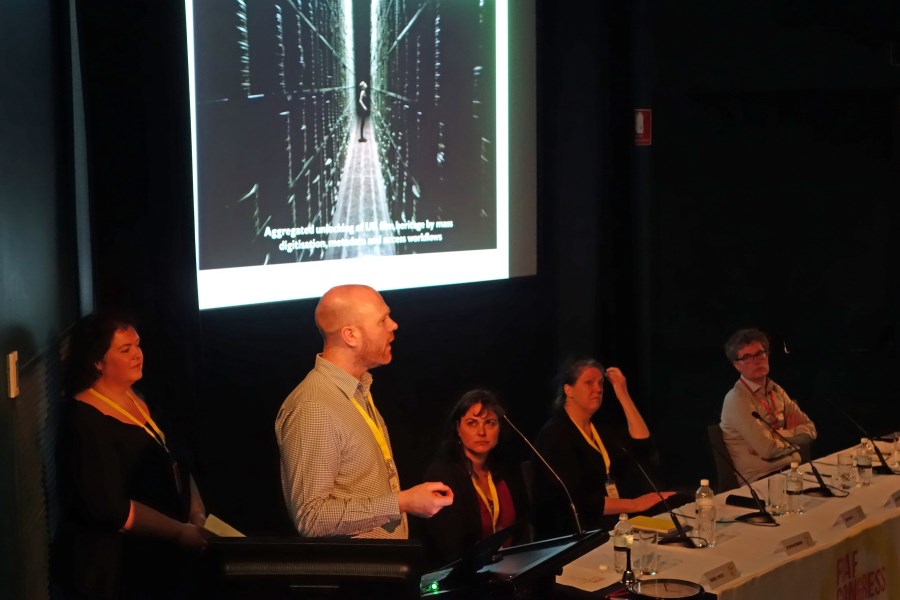
Dutch Solutions to Clear Legal Obstacles
Speaker: Leontien Bout, EYE Filmmuseum Amsterdam / Association of European Cinematheques (ACE)
Abstract: As it becomes ever more clear (in Europe} that copyright legislation {on every level) will not change any time soon in favour of archives, it is up to the archives themselves to come up with creative solutions in order to fulfil their missions, especially disclosing their collections to the public.
At EYE, while being confronted with the impact of copyright related matters on daily archival practices, and especially during the mass digitisation project “Images for the Future” we have found different ways to deal with it. We will present some of these solutions so they hopefully can serve as an inspiration for archives around the world facing similar challenges.
Access the slideshow presentation HERE.
Listen to the presentation HERE.
Access the text of the presentation HERE.
Digitizing Analogue Collections – Selection and Curatorial Policies
Speaker: Jon Wengström, The Swedish Film Institute
Title of the presentation:
Abstract: The Swedish Film Institute (SFI) received additional funding of € 4,5M to digitize 500 films from its collection 2014-18. For reasons of curatorial control, the SFI decided to spend the money by acquiring equipment and hiring new staff to carry out the work in-house. To guide the work two policies were adopted, one dealing with selection criteria and relations with rights holders, and one dealing with ethical issues involved in treatment of sound and image. This curatorial policy was a crucial step to have old and new members of the team adhering to a set of common principles.
Access the slideshow presentation HERE.
Listen to the presentation HERE.
